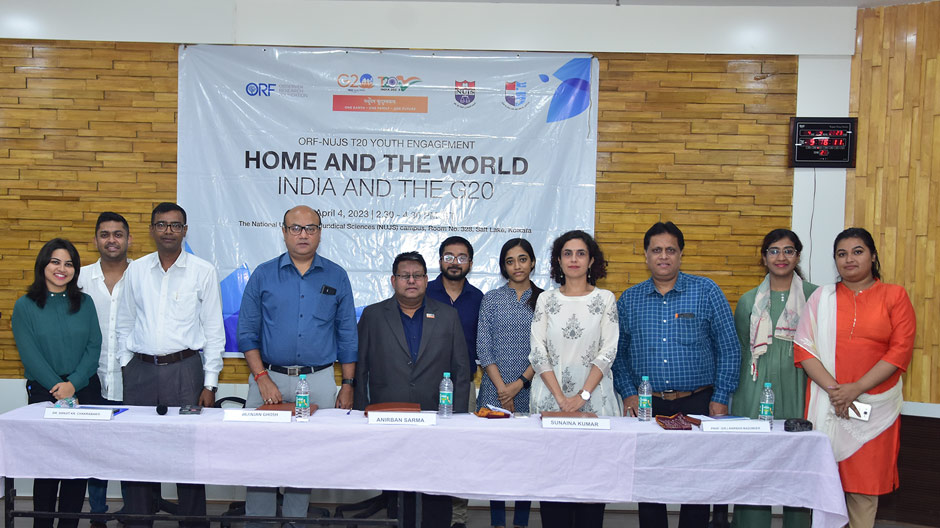In line with one of the seven thematic task forces that constitute the T20: ‘Our Common Digital Future: Building Affordable, Accessible and Inclusive Digital Public Infrastructure (DPI)’ the Observer Research Foundation (ORF) Kolkata, in collaboration with the National University of Juridical Sciences (NUJS), hosted a T20 Youth Engagement side event on the theme “Home and the World: India and the G20”.
The event predominantly focused on familiarising the youth with the workings of the G20 and the reach, impact, and significance of the T20 platform, featuring talks on the concept and uses of digital public infrastructure (DPI). In his welcome address, Professor Sanjit Kumar Chakraborty, Director, Centre for Law and Social Justice, NUJS remarked on the title of the discussion ‘Home and the World’ and related it with the theme of India’s G20 Presidency—“Vasudhaiva Kutumbakam” or “One Earth, One Family, One Future” and how the endorsement of this concept is embedded in Indian culture and civilisation. He then associated this theme with the concept of globalisation and the idea of cosmopolitanism whereby human civilisation as a whole must progress towards the upliftment of human values irrespective of their citizenship or other affiliations.
The panel discussion was initiated by Sunaina Kumar, the Executive Director of the Think20 India Secretariat. She gave a brief introduction to the T20 and provided an overview of its engagement with the G20 during India’s presidency. She emphasised the importance of ensuring geographical diversity in the representation of the T20 engagement group. She also discussed the functions of the T20 and highlighted several significant issues that the G20 is committed to addressing, including macroeconomics, digitisation, clean energy, green transition, and the Sustainable Development Goals (SDGs). Additionally, she mentioned the innovative ways in which the T20 Secretariat in India is engaging with young people, such as through the IDEAS@T20 portal, which allows for ideas to be posted and the submission of policy briefs and commentaries. She also deliberated regarding reform multilateralism and its importance in today’s world.
Dr Nilanjan Ghosh, the Director of the Centre for New Economic Diplomacy, ORF and T20 Secretariat Director, discussed India’s growth story, with a focus on the geopolitics, geoeconomics, and ‘sustainomics’ of the country. He provided a brief explanation of regional trade agreements and free trade agreements (FTAs) before delving into India’s concerns with the Regional Comprehensive Economic Partnership (RCEP) that led to its withdrawal from negotiations in 2019. Dr Ghosh rationalised India’s decision based on its increasing trade deficit with China, unfavourable balance of trade with most RCEP countries, and the country’s business competitiveness prospects among all RCEP nations.
Dr Ghosh went on to highlight India’s efforts to seek alternative geoeconomic opportunities through FTAs with friendly nations such as the India-UAE Comprehensive Economic Partnership Agreement, the India-Australia Comprehensive Economic Cooperation Agreement, and the United States-launched Indo-Pacific Economic Forum. He emphasised how these agreements are providing India with significant economic and geostrategic opportunities.
Lastly, he pointed out that despite the prevailing global economic challenges, India continues to demonstrate high and resilient economic growth due to its massive human capital pool and continued investment in infrastructure. In his view, India can emerge as a sustainable success story even in a dismal global economy, with Indian diplomacy playing a vital role in leveraging the country’s potential.
Dr Anirban Sarma, Senior Fellow, ORF and Chair of Task Force 2 on ‘Our Common Digital Future: Building Affordable, Accessible and Inclusive Digital Public Infrastructure (DPI)’ emphasised that India has been at the forefront of creating DPIs, such as Aadhaar and Unified Payments Interface (UPI), which have facilitated the implementation of crucial social protection schemes at a large scale. These initiatives have significantly contributed to India’s social and economic growth and helped achieve Sustainable Development Goals. The Government of India recognised the significance of DPIs and listed them as a priority area during its G20 Presidency last year. With the successful implementation of DPI initiatives in India, the country is well-positioned to lead the conversation around DPIs on the global stage.
Thus, for India’s DPI success to become a worldwide revolution, he emphasised the advancement of three types of institutions. First, to develop independent DPI steward institutions, second, to develop global standards through a multilateral dialogue led by India and lastly, to create sustainable financing models for developing DPI for the world.
Anirban Mazumdar, Professor, NUJS, elucidated access to knowledge from the perspective of the DPI. He highlighted the importance of the protection of data and effective cyber security regime for the public good which is absent in the current modes of digital platforms and services. A significant portion of online public space consists of accidental public infrastructure, such as tools, platforms, and services that were initially developed to address specific issues, such as staying connected with friends, or, displaying advertisements on websites. Over time, these tools have evolved into essential infrastructure for both online and offline public and civic life. Nevertheless, they lack a sense of obligation to safeguard public data and involve them in policymaking. Consequently, there is a need for a more responsible, secure, and reliable infrastructure that can accommodate a diverse range of ideologies and identities. This is where digital infrastructure comes to play an important role in ensuring access to information.
Following Dr Mazumdar’s address, seven presentations were delivered by students from six universities: NUJS, Amity University, Sister Nivedita University, George School of Law, Sidho Kanho Birsha University, and St. Xaviers University keeping with the theme. The T20 side event culminated in a Q and A session, where both students and attendees were granted the opportunity to pose their questions to the panellists.
This report is compiled by Sreeparna Banerjee, Junior Fellow, Observer Research Foundation




